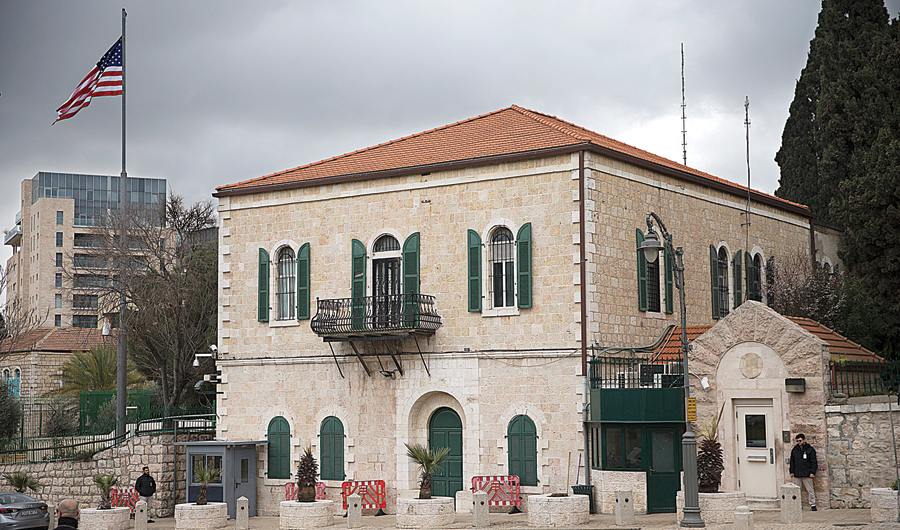Closure of American consulate in Jerusalem rapped as ‘political assault’
AMMAN: The controversial closure of the US diplomatic mission which has served Jerusalem for more than 175 years was on Monday branded a “political assault” on the Palestinian people.
US Ambassador to Israel David Friedman officially shuttered the consulate by thanking its Consul General Karen Sasahara for her “service and professionalism” and wishing her well representing America in her next posting.
“This decision was driven by our global efforts to increase the efficiency and effectiveness of our diplomatic engagements and operations,” a US State Department spokesman said in a statement.
The three-story Jerusalem mansion, with its arched windows and bougainvillea-covered walls, was where the unofficial US envoy to the Palestinians lived and hosted Palestinian guests for Fourth of July parties.
The estate will now become the domain of the US ambassador to Israel, a move which has been criticized in many quarters.
Hanna Issa, secretary-general of the Islamic-Christian Commission to Support Jerusalem and the Holy Sites, told Arab News that the lowering of American diplomatic representation to Palestine was a continuation of discriminatory US policy.
“The attempts to merge the US consulate with the embassy is a contradiction of international law and specifically UN Security Council resolution 478 (one of several UN resolutions condemning Israel’s attempted annexation of East Jerusalem) of 1980,” said Issa.
Issa said the real purpose behind the US decision was to obliterate the idea of a Palestinian state alongside Israel.
In a statement issued on behalf of the Palestine Liberation Organization (PLO), executive committee member Hanan Ashrawi said that the merging of the consulate with the embassy “is not an administrative decision. It is an act of political assault on Palestinian rights and identity, and a negation of the consulate’s historic status and function, dating back nearly 200 years.”
Speaking to National Public Radio former US diplomat Ed Abington, who served in Jerusalem, noted that historically the position of Washington had been that the embassy in Tel Aviv and the consulate in Jerusalem “should not be merged.”
Abington said that “the effect on our ability to deal with the Palestinians is being greatly damaged.”
Jerusalem-based Israeli lawyer Daniel Seidemann told Arab News that the closure of the consulate was no mere merger.
“The consulate will not merge, but it will be subsumed into the embassy to Israel,” Seidemann said. “This is no mere technicality, it precisely reflects current US policies: All things Palestinian are subservient to Israeli interests.”
The US decision has been met with a storm of opposition from a wide spectrum of American diplomats.
Former US Under Secretary of State Nicholas Burns called it “a mistake,” and said that all US presidents prior to Donald Trump had “understood its importance as our bridge to the Palestinian people. I was proud to serve there in the 1980s.”
Dennis Ross, chief US negotiator with both Republican and Democratic administrations, criticized the move as “unfortunate” noting that the Palestinian public would read it “as a sign of indifference to them.”
Ross said that the US administration needed to take steps “to reach out to Palestinians if it is to have any hope for its plan.”
Hady Amr, a US researcher who worked in the Jerusalem consulate, said in a personal tweet that he was pained by the decision. “My heart is heavy. America should be playing the taps. A place I was honored to work out of during many trips in support of Secretary John Kerry (former US Secretary of State).”
Amr and security expert Ilan Goldenberg prepared a study for the Washington-based research group Brookings Institution which concluded that “merging units sounds efficient. But this merger does major harm to the US ability to act as a mediator in the conflict and serves as a severe blow to the prospects of Israeli-Palestinian peace through a two-state solution.”
Jake Walles, a former consul general in Jerusalem, called the closure “a sad end to an important US diplomatic mission.”
Israeli journalist Noa Landau tweeted that shutting the US consulate would have a negative effect on reporting about Jewish settlements.
“Reports about construction in new settlements will now be overseen by Ambassador Friedman, a longtime supporter of the settlement enterprise.”
US President John Tyler was the first consul general in Jerusalem in 1844.
The first physical presence of a US mission there was inside Jaffa Gate in the old city of Jerusalem, a building that is now being used for Christian Swedes.
The mission then moved to Prophet Street outside the old city, and in 1912 it was moved to its current location on 18 Agron Street in a building that was established in 1868 by the German Lutheran missionary Ferdinand Vester, whose family would later build what became the American Colony.
The US also rented another building in 1951 on Nablus Road and this was kept as a US consular building until September 2010.

US closes Jerusalem consulate, demoting Palestinian missionUS downgrade of Palestinian mission to take effect Monday: official


